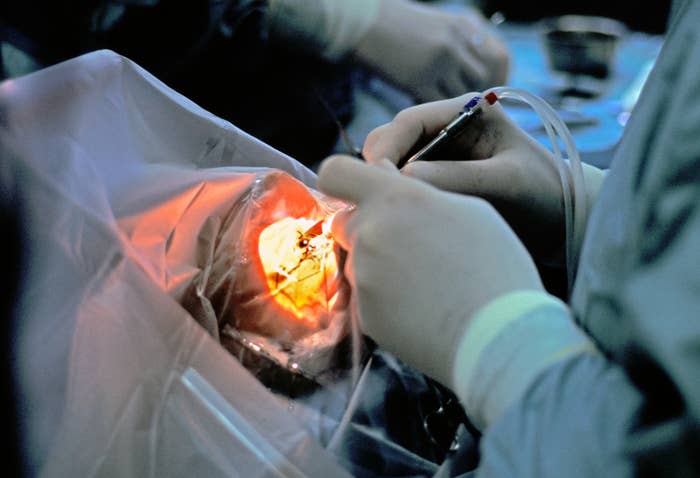
Under a new settlement with the federal government, a Texas compounding pharmacy will be allowed to stay in business under certain conditions after it allegedly made an eye injection that partially blinded at least 68 patients.
As BuzzFeed News reported in September, the patients say that the company, Guardian Pharmacy Services, made a faulty, knockoff version of a drug called TriMoxi, which was injected into their eyeballs as part of routine cataract surgeries in late 2016 and early 2017. They say they were told that the medication would speed up healing, when in fact it irreversibly damaged their vision. The patients’ injuries underscored the relatively little regulation that holds compounding pharmacies accountable, despite recent efforts to strengthen federal oversight.
On Monday, a federal court in Texas ordered Guardian to stop producing compounded sterile drugs until it complies with the federal Food, Drug, and Cosmetic Act and other requirements. The company must also pay the costs of the FDA’s future efforts to ensure that it is complying.
In a March 6 complaint, the Department of Justice found that Guardian had committed multiple safety violations, ranging from having unclean lab environments to mislabeling drugs to failing to have required patient prescriptions. Despite making multiple promises to correct these problems as early as November 2017, the compounder continued to violate the law. (It is not related to another pharmacy with the same name, which is headquartered in Atlanta but has a branch in the Dallas area.)
Without admitting or denying wrongdoing, Guardian agreed to the DOJ settlement, which will be in effect for at least five years. It states that the company can produce sterile drugs once it brings its manufacturing processes into compliance; establishes safeguards to prevent future contamination; and hires an independent expert to verify that it has fixed its mistakes and to periodically audit its facility.
The court agreement does not estimate how much this will cost Guardian in total, but does specify that the FDA can charge them roughly $100 per hour. Andrew Sommerman, a Dallas attorney representing dozens of the cataract patients in a separate civil lawsuit, said the punishment was too light. “It’s not ‘you’re out of business,’ it’s not anybody going to jail,” he told BuzzFeed News.
“We have 60-plus people with a blind eye. If you go around and poke 60 people in the eye, you’d be in a lot of trouble. But apparently if you’re just going to inject them with a toxic chemical, that’s okay.”
But FDA Commissioner Scott Gottlieb said that the settlement demonstrated the FDA’s commitment to regulating compounding.
“This case is yet another reminder of why unlawful compounding is fraught with risk, how bad actors who have the potential to significantly harm people persist and why the FDA’s work in collaboration with our state partners remains critical to protecting consumers,” he said in a press release on Tuesday.
Larry Sasich, an independent pharmacy expert who has followed Guardian’s case closely, told BuzzFeed News that the FDA appears to have saddled the pharmacy with significant obligations before they can resume business. “It looks to me like they threw the book at them,” he said, adding, “I don’t see how they can operate.”
The DOJ’s findings of wrongdoing may also bolster the lawsuit from Sommerman’s clients, which is expected to go to trial later this year, he said.
He and other attorneys are suing Guardian; the Dallas surgery centers that administered the drug, the Key-Whitman Eye Center, and the Park Central Surgical Center; and the company accused of developing the drug’s shoddy recipe, the Professional Compounding Centers of America, along with executives, doctors, and pharmacists associated with some of the companies. All the defendants have blamed each other for the botched drug and injuries.
The government only sought an injunction against Guardian. “I am pleased that we could reach an agreement with the Department of Justice and the Food and Drug Administration,” said Jack Munn, president of Guardian, through a spokesperson.
Compounding pharmacies customize drugs to specific patient needs — like a pill in liquid form — when those drugs aren’t sold by pharmaceutical companies. Unlike pharmaceutical companies, however, compounders are not required to demonstrate that their products are safe, effective, and FDA-approved.
In 2013, Congress passed a law to strengthen federal oversight of compounders after more than 60 people died from contaminated drugs produced by a Massachusetts facility. In that case, multiple executives have since been tried on criminal charges, and the pharmacy’s owner has been convicted of more than 50 counts of mail fraud and racketeering.
But the lucrative industry appears to still enjoy regulatory loopholes. The Dallas patients are likely the biggest group of people to claim harm from compounding errors since the Massachusetts tragedy.
Under the 2013 Drug Quality and Security Act, the FDA is not primarily responsible for the category of compounders that make up most of the industry: small outfits that tailor drugs for individual patients. These are mainly regulated instead by state pharmacy boards, with the FDA able to step in as needed.
But state rules and enforcement vary widely. As of today, despite FDA’s findings to the contrary, the Texas pharmacy board’s website says that Guardian’s disciplinary record is clean.
UPDATE
This story has been updated to clarify that the company in the lawsuit, Guardian Pharmacy Services, is distinct from another company with the same name.
